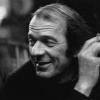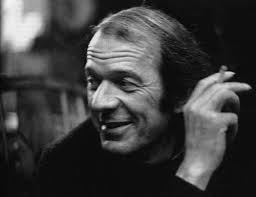Description
The Deleuze Seminars is a collection of audio recordings, transcriptions, and English translations of, and supplemental materials from, the lectures French philosopher Gilles Deleuze gave during his career at the University of Paris 8.
"Foucault" was a 25-lecture seminar given from October 1985 to May 1986. In these lectures, Deleuze offers his interpretation and analysis of French philosopher Michel Foucault's work. Examining the theoretical foundations and major themes of Foucault's philosophy, Deleuze dedicates several lectures to each of what he calls the "three axes" of Foucault's thought. This seminar coincides with the publication of Deleuze's book Foucault (1986).
In the 29 April 1986 lecture, topics of discussion include: the French botanist, anthropologist and linguist André Haudricourt and the French agronomist and botanist Louis Hédin; the journals La Pensée (no. 171, October 1973) and L'homme (1962); the philosophies of transcendence and immanence; the Orient and the Occident; work, agriculture and breeding; Haudricourt, the figures of the sower (le semeur) and the pastor, and Plato's Statesman (Le Politique); plant form (la forme végétale) and the planter (le jardinière) in Eastern thought; that thought comes from the outside (dehors); the outside as the most absolute distance in relation to all forms of exteriority, yet at the same time the closest to any form of interiority; Blanchot's The Space of Literature; the fold and the line of the outside; the place of the unthought (l'impensé) in thought; Heidegger, the idea that "we do not yet think" (nous ne pensons pas encore), and the veiling and unveiling of thought; that what is folded in the fold is the unfold; forgetfulness, Plato and reminiscence, memory, and truth for the Greeks and unveiling; the 'already there' (déjà là) and the 'not yet' (pas encore) of temporality; subjectivity, and the subject and its doubles in Foucault's The Order of Things; the notion of the double as a doubling of the other; the repetition of the different; the place in immanence of a non-self (non moi); subjectivity in Roussel's Chiquenaude and Impressions of Africa; French symbolist writer Alfred Jarry, his book Exploits and Opinions of Dr. Faustroll, Pataphysician, pataphysics and metaphysics, and the being of phenomenon; puns (les jeux de mots); the statement (l'énoncé) and repetition in The Order of Things; French surrealist writer and ethnographer Michel Leiris, the fold of being and the Greeks; the confrontation between Foucault and Heidegger; that if the folding of the line of the outside has meaning it is that it turns the line of the outside away from death (se détourne de la mort) and produces a subjectivity, encompassing (s'entourner) itself with folds; that the folding of statements produces their doubles; the etymological exercises of Heidegger and Roussel; the question of the invention of philosophy by the Greeks as the question for German romanticism; the concepts of territory and foundation and how to return (rejoindre) to the earth and the sacred; Heidegger, the first act of developing a territory, clearing (défrichement) and deforestation (déboisement), the Greek light, the revelation of being, and the clearing (la clairière); Heidegger, French philosopher Jean Beaufret, and the verb 'to be' (être) as the word around which all Greek language folds; German philosopher G.W.F. Hegel, and Being as beings, both in space (the clearing) and in the verb (the copula); Descartes and the philosophy of the subject; and the three successive moments of the universal.
Deleuze also examines how the ancient sages expressed themselves first through poetry and the later rise of the society of 'friends of wisdom' and the subsequent development of wisdom in three directions: 1) the philosophical direction (from Hegel to Heidegger), the French philologist and historian Ernest Renan and the Greek miracle, and aletheia; 2) the appearance of the philosophical speech (la parole philosophique), the school of French Hellenists, and the appearance of a new space of the thought in the works of French historian and anthropologist Jean-Pierre Vernant, French historian Pierre Vidal-Naquet, and Belgian classicist and historian Marcel Detienne; and 3) the political direction and Foucault's The History of Sexuality, Vol. 3: The Use of Pleasure (L'usage des plaisirs).
This dataset includes: five mp3 recordings of the lecture (total time, 2:49:21), an aggregate version of the audio recordings into a single mp3, and the complete French transcription of the recorded lecture in both pdf (28 pp) and plain text.
Note: In the part 4 audio file, from the (approx.) 32:38 mark to the end of the file has not been transcribed. This corresponds to the (approx.) 2:18:48-2:32:15 marks of the complete audio file.
-
Les Séminaires de Deleuze sont une collection d'enregistrements audio, de transcriptions et de traductions en anglais et de documents complémentaires des conférences que le philosophe français Gilles Deleuze a donné lors de sa carrière à l'Université de Paris 8.
«Foucault» était un séminaire de 25 conférences donné d'octobre 1985 à mai 1986. Dans ces conférences, Deleuze offre son interprétation et son analyse de l’œuvre du philosophe français Michel Foucault. En examinant les fondements théoriques et les thèmes majeurs de la philosophie de Foucault, Deleuze consacre plusieurs conférences à chacun de ce qu'il appelle les «trois axes» de la pensée de Foucault. Ce séminaire coïncide avec la publication du livre de Deleuze Foucault (1986).
Dans la conférence du 29 avril 1986, les sujets de discussion comprennent: le botaniste, anthropologue et linguiste français André Haudricourt et l'agronome et botaniste français Louis Hédin; les journaux La Pensée (n° 171, octobre 1973) et L'homme (1962); les philosophies de la transcendance et de l'immanence; l'Orient et l'Occident; le travail, l'agriculture et l'élevage; Haudricourt, les figures du semeur et du pasteur, et Le Politique de Platon; la forme végétale et la jardinière dans la pensée orientale; que pensée vient du dehors; le dehors comme un lointain le plus absolu par rapport à toutes les formes d'extériorité, mais en même temps le plus proche de toute forme d'intériorité; L'Espace littéraire de Blanchot; le pli et la ligne du dehors; la mise de l'impensé dans la pensée; Heidegger, l'idée que «nous ne pensons pas encore», et le voile et le dévoilement de la pensée; que ce qui plié dans le pli est le dépli; l'oubli, Platon et la réminiscence, la mémoire, et la vérité pour les Grecs et le dévoilement; le déjà là et le pas encore de la temporalité; la subjectivité, et le sujet et ses doubles dans Les mots et les choses de Foucault; la notion du double comme redoublement de l'autre; la répétition du différent; la mise en immanence d'un non moi; la subjectivité dans Chiquenaude et Impressions d'Afrique de Roussel; l'écrivain symboliste français Alfred Jarry, son livre Gestes et opinions du docteur Faustroll, pataphysicien, pataphysique et métaphysique, et l'être du phénomène; les jeux de mots; l'énoncé et la répétition dans Les mots et les choses; l'écrivain et ethnographe surréaliste français Michel Leiris, le pli de l'être et les Grecs; la confrontation entre Foucault et Heidegger; que si le plier de la ligne du dehors aura du sens, c'est qu'elle se détourne la ligne du dehors de la mort et produit une subjectivité, s'entourner de plis; que le pli des énoncés produisant leurs doubles; les exercices étymologiques de Heidegger et Roussel; la question de l'invention de la philosophie par les Grecs, la question pour le Romantisme allemand; les notions de territoire et de fondation et comment rejoindre à la terre et au sacré; Heidegger, l’acte premier d’aménager d'un territoire, défrichement et déboisement, la lumière grecque, la révélation de l'être et la clairière; Heidegger, le philosophe français Jean Beaufret, et le verbe «être» comme le mot autour duquel se plie toute la langue grecque; le philosophe allemand G.W.F. Hegel, l’être en tant qu'être, à la fois dans l'espace (la clairière) et dans le verbe (la copule); Descartes et la philosophie du sujet; et les trois moments successifs de l'universel.
Deleuze examine aussi comment les anciens sages se sont exprimés d'abord par la poésie et la montée ultérieure de la société des «amis de la sagesse» et le développement subséquent de la sagesse dans trois directions: 1) la direction philosophique (de Hegel à Heidegger), l'historien Ernest Renan et le miracle grec, et aléthéia; 2) l'apparition de la parole philosophique, l'école hellénistes français, et l'apparition d'un nouvel espace de la pensée dans les œuvres de l'historien et anthropologue français Jean-Pierre Vernant, l'historien français Pierre Vidal-Naquet, et le classiciste et historien belge Marcel Detienne; et 3) la direction politique et L'usage des plaisirs de Foucault.
Cite this work
Researchers should cite this work as follows:
- Gilles Deleuze (2018). Foucault: Lecture 21, 29 April 1986. Purdue University Research Repository. doi:10.4231/R7JD4V0M
Tags
Notes
This research has been generously supported through a grant from the College of Liberal Arts, Purdue University.
The translations of Deleuze’s “Foucault” seminars have been made possible by a Scholarly Editions and Translations grant from the National Endowment for the Humanities. This research has also been generously supported through a grant from the College of Liberal Arts, Purdue University.
The description of this dataset is based on the meticulous work of Frédéric Astier, whose Les cours enregistrés de Gilles Deleuze, 1979-1987 has catalogued Deleuze’s seminars for those years.
Special thanks to the family of Gilles Deleuze, the University of Paris 8, and the Bibliothèque nationale de France for permission to reproduce the material published here.
The Deleuze Seminars
This publication belongs to the The Deleuze Seminars group.

